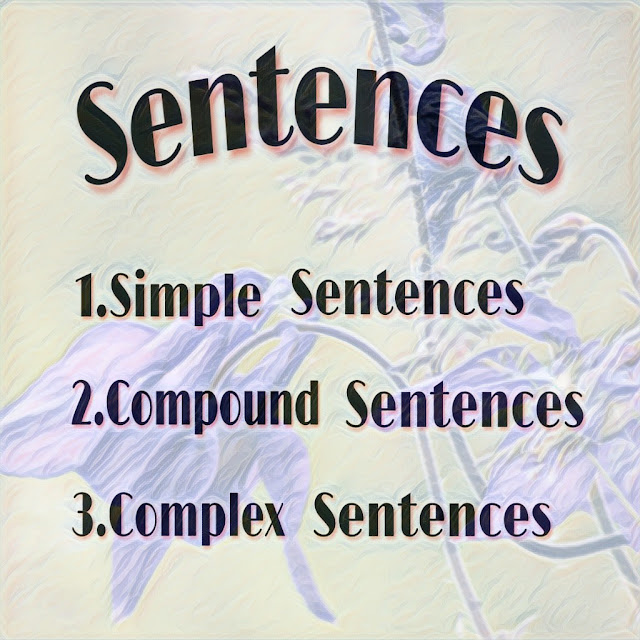For learning English Grammar, we firstly should know about 'Sentence' and 'Clause'. So we will have to understand 'Sentence' and 'Clause' before knowing about 'Simple', 'Compound' and 'Complex Sentences'.
Sentence - A Sentence is a group of words that makes complete sense. A sentence must begin with a capital letter. A sentence must end with a full stop (.). A question sentence must end with a question mark (?). Every sentence has two parts - the Subject and the Predicate.
Subject - The Subject is what we are talking about.
Predicate - The Predicate is what we say about the subject, e.g:
The cow is a useful animal.Here 'The cow' is the Subject and 'is a useful animal' is the Predicate.
Therefore Subject and Predicate are necessary to make complete sense.
Clause - The part of the sentence which has 'one Subject' and 'one Finite Verb' is called Clause, e.g:
He told me that he would help me.
In above sentence, 'that he would help me' is the part of the complete sentence in which 'he' is Subject and 'would help' is Finite Verb. So 'that he would help me' is a Clause.
Types of Clauses:
1) Principal Clause - The clause which does not depend on other clause for its meaning is called Principal Clause. It is also called Independent Clause, e.g:
1) I don't know where he works
2) He is the boy who won the prize.
In above sentences, 'I don't know' and 'He is the boy' are Principal Clauses because they give complete meaning.
2) Co-ordinate Clause - This Clause is an Independent Clause because it does not depend on other clause. Two simple sentences are combined with each other with one Co-ordinate Conjunction,e.g:
1) I shall go and he will follow me.
2) God made the country and Man made the town.
In sentence 1, 'I shall go' and 'he will follow me' are two independent clauses but the clause which starts with Co-ordinate Conjunction is called Co-ordinate Clause.
3) Subordinate Clause - This clause does not have complete meaning in itself. It depends on Principal Clause to clear its meaning, e.g:
1) I asked him why he was shouting.
2) He didn't succeed though he worked hard.
In sentence 1, 'why he was shouting' is not able to give its complete meaning, it depends on 'I asked him' for its meaning. Therefore 'why he was shouting' is Subordinate Clause.
 |
| Sentences : Simple, Compound & Complex |
Types of Sentences: Sentences are of three types:
1) Simple Sentences
2) Compound Sentences
3) Complex Sentences
1) Simple Sentence : A sentence which has only one subject and one predicate is known as a Simple Sentence.
Look at he following sentences :
1) He works hard.
2) She speaks politely.
3) Mr. Smith taught us last year.
4) He could not refuse my offer.
5) It has been raining since morning
Each of these sentences has only one subject and one predicate.
Subject
|
Predicate
|
He
|
works
hard.
|
She
|
speaks
politely.
|
Mr. Smith
|
taught
us last year.
|
He
|
could
not refuse my offer.
|
It
|
has
been raining since morning.
|
2) Compound Sentence : A Compound Sentence is composed of two or more co-ordinate clauses. All its clauses are of equal rank, and are called Co-ordinate Clauses. 'and', 'but', 'as well as', 'still', 'yet', 'while', 'so', 'either-or', 'neither-nor', 'not only-but also', 'or', 'otherwise', 'nevertheless' are Co-ordinate Conjunctions that are used in Compound Sentences.
The following sentences are compound sentences.
1) Sam likes
Mathematics but Tom hates it.
Co-ordinate Clause Co-ordinate Clause
In this compound sentence, two Co-ordinate Clauses 'Sam likes Mathematics' and 'Tom hates it' are joined by the Co-ordinate Conjunction 'but'.
2) The guard waved the train and the train started.
Co-ordinate Clause Co-ordinate Clause
In sentence 2, two Co-ordinate Clauses 'The guard waved the train' and 'the train started' are joined by the Co-ordinate Conjunction 'and'.
3) Complex Sentence : A Complex Sentence is composed of two or more clauses. One of the clauses in a Complex Sentence is more important than the other/others. The more important clause is called the Main Clause or the Principal Clause. The less important clause/clauses is/are called the Subordinate or Dependent Clause/Clauses. Some Subordinate Conjunctions, linked to Subordinate Clauses, are 'as', 'because', 'before', 'after', 'while', 'if', 'though', 'although', 'so that', 'as soon as', 'as long as', 'as much as', 'till', 'until', 'unless', 'as if', 'then', 'that', 'how', 'when', 'why', 'what', 'who', 'whom', 'whose', 'which', 'whether'.
Study the following sentences :
1) We do not know when he will come.
2) This is the boy who won the prize.
3) You can buy whatever you like.
4) He said that he would pass.
5) This is the place where we met last year.
Principal
Clause
|
Subordinate
Clause
|
We do not know
|
when
he will come.
|
This is the boy
|
who
won the prize.
|
You can buy
|
whatever
you like.
|
He said
|
that
he would pass.
|
This is the place
|
where
we met last year.
|
A sentence which consists of a Main Clause (Principal Clause) and one or more Subordinate (Dependent) Clause (s) is called Complex Sentence.
Difference between the Compound Sentence and the Complex Sentence :
Both the compound sentence and the complex sentence are made up of at least two clauses. Then, what is the difference between them? The clauses of a compound sentence are of equal importance, whereas this not so in the case of a complex sentence. In a complex sentence, one clause is more important than the other (s).
Study the following carefully :
Compound Sentence
He worked hard but he did not succeed.
Co-ordinate Clause Co-ordinate Clause
Here the two clauses are of equal importance. 'but' is Co-ordinate Conjunction.
Complex Sentence
Although he tried hard, he did not succeed.
Subordinate Principal Clause
Clause
'he tried hard' is Subordinate Clause and it is linked to Subordinate Conjunction 'Although'. Here the Principal Clause is more important than the Subordinate Clause because it is an Independant Clause. It does not depend on Subordinate Clause.
Clause
'he tried hard' is Subordinate Clause and it is linked to Subordinate Conjunction 'Although'. Here the Principal Clause is more important than the Subordinate Clause because it is an Independant Clause. It does not depend on Subordinate Clause.





